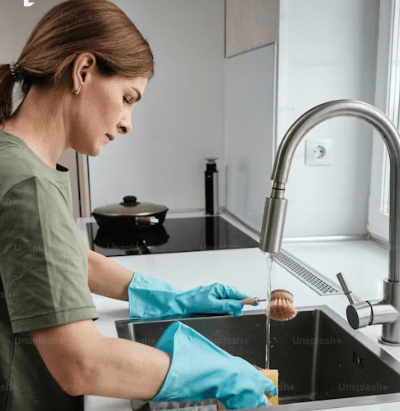
Is your kitchen looking untidy and crowded? Do you find it difficult to clean your kitchen properly, especially after cooking food?
A dirty kitchen can be a breeding place for germs and bacteria, thus exposing family members to health risks. Additionally, cooking in a squeezed space can be stressful and frustrating. It is also very embarrassing when visitors come into the home and find the house all messed up.
Come on! Take a look at our complete guide for kitchen cleaning. Follow the procedure mentioned above and useful guidelines to convert your kitchen into a welcoming haven. Never again will you have dirt and mess; instead, keep your kitchen clean, tidy, and hygienic.
Table of Contents
Importance of Kitchen Cleaning
A clean kitchen is essential for one’s well-being and protection. This minimizes the chances of bacteria, viruses, and other pathogens infecting food. Regular sanitization of surfaces, utensils, and appliances helps keep these dangerous microorganisms from spreading.
When your kitchen is tidy and ordered, finding the equipment, ingredients, or even utensils becomes easier. Everything is in order, which saves time when cooking. You will have more concentration in cooking instead of cleaning up messes.
Regular maintenance ensures that kitchen appliances live beyond their expected lifespan. Failure to remove grease, dirt or food particles can cause damage to units making them deteriorate at a faster rate.
A clean kitchen looks much nicer and more attractive to anyone entering it. It is makes a good atmosphere where you can prepare meals and hang out with family members: while vending machines for home use are not an option. A neat space also represents a high level of housekeeping standards.
A clean and orderly kitchen can help reduce stress levels as well as anxiety attacks. A dirty environment can be overwhelming so having a clean environment brings about some sort of control and orderliness. Besides this; it will help improve your mood since meal preparation becomes funnier
Challenges of Keeping a Clean Kitchen

Cleaning Kitchen is always one of the toughest things to do. Busy people may not be able to fulfill their daily cleaning duties, causing dirt and messiness to accumulate.
The kitchen is a good place for food and oil stains to stay when cooking is going on. This could become almost impossible to solve if you don’t have the right machinery or skills.
This mainly comes about since the kitchen is the center of the house and it gets used quite often as well. One can hardly keep things tidy as there are messes left all over due to movement of people around.
It can be difficult to ensure that every person in a multi-person household cleans similarly. Different opinions about cleanliness or what should be done in order for us to clean our kitchens lead to arguments and untidy kitchens.
While not having enough storage space makes it hard for one to keep her kitchen clean, too much of it results into a messy one too. Arranging utensils, saucepans, ingredients etc is necessary but sometimes this could be challenging especially when the space available is little.
Daily/Quick Cleaning Hacks: Kitchen Edition
Keeping your kitchen clean on a daily basis can seem like a daunting task, but with these quick and effective hacks, you’ll have a spotless kitchen in no time. Here are few Daily/Quick Kitchen Cleaning tips:
1. Clean As You Cook
Remember always to wipe down the counters, stovetops as well as other places used when cooking so that they do not become harder to clean afterwards. When frying or cooking with oil use a spill guard for your stove top.
2. Microwave Cleaning
In order to be able to heat in the microwave, bowl should be safe. Add water and lemon slices into it. Place the microwave on high for 5 minutes and then switch it off. The steam will loosen soil making wiping away simple. Take a bowl that can fit inside the microwave with equal amounts of vinegar and water in it. Heat it two or three minutes and wipe it down after.
3. Sink and Faucet Maintenance
Clean the sink and tap with dish soap on a sponge or cloth before you put away dirty dishes. For tougher stains combine baking soda with water until paste is formed. Apply this paste, let set few minutes then scrub and rinse.
4. Dishwasher Care
If necessary wash laundry each day. Empty them right away so there would be no accumulation or odors. In order to keep its good performance take out filter once per month from the dishwasher machine for cleaning.
5. Countertop Clarity
Do not have items on your counters if you don’t need them. Put frequently used things in boxes or trays so that they are kept orderly. Daily, especially after preparing food, use a cleaning spray or wipes on countertops.
6. Refrigerator Freshness
Every day discard any spoilt expired food. Wipe shelves and boxes often using damp cloth to prevent sticky spills from happening.
7. Floor Focus
Pick up crumbs and various junk by sweeping your kitchen floor every day. Clean up spills immediately so they do not result in discoloration/stickiness. Regardless of how much you sweep the floor, it does not guarantee that your kitchen is clean.
8. Trash Can Tidiness
To prevent its bad smell and overspill, empty the dustbin daily. Use a cleaner to inside and outside of the trash can every week.
If you adopt these everyday cleaning tips, your kitchen will be kept clean and friendly with little effort. Have fun cleaning!
Deep Cleaning Hacks: Kitchen Edition
Sometimes, however, when cleaning your kitchen, you can be faced with stubborn grease and grime, which are very hard to remove. However, if you understand how to do it and have the required equipment in place, you can make your kitchen shine. Below are some useful tips on how to use vinegar and baking soda:
1. Baking Soda
Baking soda is good for many things and is a great way to get rid of greases. The tablet can be spread across any oily surface such as stoves, tables or even inside an oven. After spreading it out, wet the powder with little water making it into a paste. Leave it sitting for fifteen to twenty minutes. Scrub the area using a sponge or old toothbrush. This works because baking soda is slightly abrasive hence helping remove grease. Use a damp cloth to clean around that area.
2. Vinegar
Vinegar on its own is another powerful cleaner that works especially well against oils. For equal parts of white vinegar and water spray in a bottle. Shower this mixture over oily places on your surfaces for ten to fifteen minutes. Mop off the oil using a clean sponge or rag. In case there are stains in these areas then use gentle scrubbing. Wash using plain water then finish by drying with a fresh towel.
3. Combining Baking Soda and Vinegar
Some fats cannot be easily removed but taking their residue would require the combination of baking soda and vinegar. Spread baking soda onto the part that has oil. Another trick will involve pouring some vinegar into that. A pop sound will occur after putting up this one which aids in disintegrating fats. Allow this blend for some time. Such parts could then be cleaned through sponging while remains may be wiped off by a damp cloth.
With these simple tricks, you will have no problem removing even the most stubborn grease from your kitchen and making it tidy again.
Maintaining a Clean Kitchen
A clean kitchen is essential for both hygiene and functionality. Here are some comprehensive tips and steps to help you keep your kitchen spotless and organized.
Daily Cleaning Routine
- Wipe clean countertops and tables with a disinfecting tissue or soapy rag. This is to prevent the growth of bacteria as well as food remains.
- Clean cabinet handles, light switches and other places that people touch often.
- In order to prevent hardening of food, wash pots, dishes, pans immediately after use or put them into the dishwasher.
- Immediately the dishwasher finish its cycle empty it out in order to prevent the accumulation of dirty utensils that can attract pests like flies.
- Scrub the sink daily so that no soap scum and food particles build up on it.
- Use baking soda mixed with vinegar to clean the sink and also deodorize it deeply.
- Sweep or vacuum the kitchen floor every day to eliminate crumbs and dirt that might attract ants or other insects.
- Do not let rubbish bins remain full until tomorrow in case you do not want any smell or pests in your house.
- To avoid bacteria gathering in there, cleanse regularly dustbins.
Weekly Cleaning Tasks
- Wipe off the exterior of appliances, such as the refrigerator, microwave and oven to remove any trace of finger marks and food remains.
- To make it easier for removing food splatters, heat a bowl of water with lemon slices in the microwave for five minutes and then wipe it down inside.
- Mop the kitchen floor to get rid of stains or spills that may be missed by sweeping alone. For your type of flooring, use a suitable floor cleaner.
- Check for expired goods and reorganize shelves so as to make them more accessible and efficient.
- Keep shelves and containers free from dust to avoid their contamination.
- Kitchen towels and sponges must be changed weekly or cleaned thoroughly. To sanitize damp sponges, they are microwaved at full power for about two minutes.
Monthly Deep Cleaning
- Empty the fridge and wash all the shelves using a mild soap.
- Dispose of rotten foodstuffs and organize the rest for adequate ventilation around them.
- Use an oven cleaner or make a paste from baking soda, water that is left in the oven. If necessary, allow it to sit overnight before scrubbing.
- Take stove burner grates off and leave them in hot, soapy water until grease and dirt are removed by scrubbing.
- Clean behind appliances such as refrigerator and stove after their removal. As a result, this will aid in removing dust, debris or even pieces of food that may have fallen there
- To maintain general cleanliness; any accumulated dust and debris should be vacuumed or swept away.
- hot soapy water before scrubbing using a brush
- Make sure they are completely dry before reinstalling to avoid mold growth.
Seasonal Tasks
- To maintain efficiency of your freezer, you need to defrost it every few months if it isn’t frost-free. Before wiping down, turn off the freezer and let the ice melt removing all items.
- Wash windows inside and out, while also dusting window sills.
- Over time, dust and cooking residues accumulate in curtains or blinds; hence they should be cleaned or laundered.
- Whenever there is a thorough pest inspection and signs such as ants, rodents or roaches are found then take the required preventive measures pertaining to them.
- You can make your refrigerator, oven or dishwasher look brand new by using a stainless steel cleaner on them so that they shine.
Tips for Maintaining Cleanliness
A tidy kitchen can prolong the lifespan of your appliances and cookware. Residual grease and food particles can cause damage over time, so regular cleaning helps maintain your equipment in good working order. This saves you money in the long run and ensures that your kitchen remains a pleasant place to spend time. Few tips for Kitchen Cleaning
- To minimize stains and scratches, avoid cutting directly on countertops. Use separate boards for different types of food to avoid cross-contamination.
- Use lids or microwave covers to prevent splatters when cooking or reheating food, which makes cleaning easier.
- Keep frequently used items within easy reach, such as spices, next to the stove, and store less-used items elsewhere to reduce clutter.
- Use labels for pantry items to maintain organization and make it easier to find what you need quickly.
- Open windows or use an exhaust fan while cooking to reduce moisture buildup and odors.
- Place liners in drawers and cabinets to catch spills and crumbs; these are easy to remove and clean.
Following these routines and tips lets you keep your kitchen clean, safe, and efficient year-round.
Conclusion
In summary, to maintain proper hygiene and make the kitchen more efficient, it is essential to keep it clean. A well-arranged and neat kitchen also helps to lower instances of food poisoning by preventing the accumulation of harmful bacteria as well as dirt. In order that you could use your kitchen for a long time without being worried about your health, surfaces should be wiped regularly, appliances need cleaning and food must be properly stored.
Besides, cleanliness in the kitchen brings joy while cooking in the restaurant or home. When everything is in their rightful places and the surfaces are free from dirty marks one can easily walk around and prepare tasty meals with s clear mind. With good cleaning agents and tools this could be a less tiresome activity than most of us take it to be an easy task.
Lastly, having regular cleaning regimes for your kitchen helps to preserve its functionality as well as improve your overall health status through better cooking experiences. Allocate a few minutes for these activities every day so that you end up with a clean organized and efficient space where enjoying cooking becomes possible.
Frequently Asked Questions:
Can you use bathroom cleaner in the kitchen?
The idea of applying some cleaners is strongly not recommended for your kitchen. They are intended for different kinds of stains and often contain hard substances that could harm the kitchen surfaces. Bathroom cleaners may be made up of strong acid or bleach that would spoil a kitchen countertop, cupboard, and appliance. There may be a risk when using any leftover residue from bathroom cleaners on food contact surfaces. Some of these strong smells can remain behind after using bathroom cleaners leading to food taste differently.
Why are my kitchen cabinets sticky after cleaning?
Several factors might lead to sticky cabinets as an aftermath of cleaning. There can be sticky residues if the cleaner is not rinsed off properly. After cleaning it, wipe with a clean, damp cloth. Grease from cooking will combine with dirt if not properly cleaned leaving a sticky film. The stickiness arises from use of inappropriate cleaner. Use the right cleanser for your cabinet material. A faded finish on older cabinets might cause them to feel sticky and need more thorough cleaning or refinishing.


